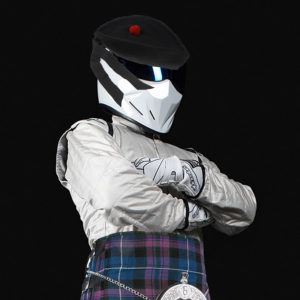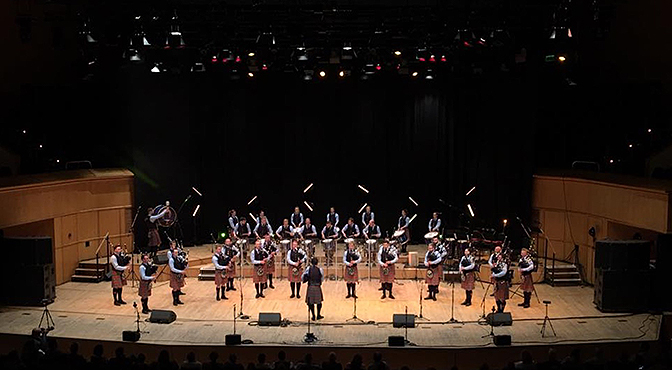
Straight off the bat, we’ll avoid the mumbo jumbo about the Pre Worlds’ Concert (PWC) band having the best chance of winning the big title itself a few days later.
However, before we get to the meat and potatoes of the concert, it was that kind of summer evening where Buchanan Street, with its statue of the late lamented Donald Dewar, welcomed the masses from far shores and beyond. Glasgow, second city of old Empire and West of Scotland, had welcomed its piping and drumming diaspora home. The Celtic cousins, Canadians, Yanks, Aussies, Kiwis. Then the Danes, Argentinians, and Austrians. An early view of the running order indeed showed Mark Saul’s ‘Diaspora’ in the opening set – how appropriate. Reminiscent of his Beaches of Harris, the soulful whistle lured us in and off we went on a journey.
A brilliant piece of acoustical planning must be mentioned firstly. In its construction phase, the then Glasgow Concert Hall, dubbed ‘Royal’ later, had some of the best acoustic fittings built-in. The significant amount of wood on the balconies, roof and surrounds were designed to create an authentic concert hall feel. It is a joy for orchestras, vocalists and soloists alike. In recent years the PWC has had purists complain about the burgeoning snare sound, regardless of the size of the pipe corps.
That is exactly what happens to percussion in these surroundings. Reed instruments are more muted and soar, whilst rattling, unchecked snares can be like breaking glass. Lead drummer Andrew Lawson avoided that royally, had discussed that very point with the Piping Press editor some weeks ago and was alive to the challenge. The sound suppression screens, often seen with acoustic kit drummers, were strategically placed in front of the drum line. In addition he used numbers cleverly too and rarely a full line. It worked.
[wds id=”6″]
A near full house with maybe no more than a few latecomers, one or two no shows. and then augmented by the standing room additions and Glasgow Skye members, this was a much anticipated concert, with probably the conundrum of an audience full of the warmest supporters, yet toughest to impress, and the most knowledgeable on the subject matter. Everyone is a judge – except the adjudicators taking a night off and simply in the audience.
And so they arrived, P/M of this, lead tip of that, groups from here and there, home and away. Sponsors, reed makers, bag makers, stick purveyors. Young, old, those in the middle. Commentators, observers and all of us, fans. Those of us from all corners of the pipe band family settled in as the lights dimmed.
Aside from the earlier mentioned Diaspora, the intro set ‘Showtime’ also included the traditional ‘Bob of Fettercairn’ (a dance, not an informal ‘Robert’) and Brown Haired Maid.
The ‘Rise’ medley followed and featured the much used Haribo Kid, the one about Jim Bruce’s Rake (you had to be there), Stirling Castle, the traditional Geese in the Bog and closed with P/M Canning’s own Rise. Mr Brown followed and settled the argument that Bill Livingstone (more of him later) has the best moustache in pipe bands, followed by Ken ‘the Captain’ Eller. Although from my memory, there was a second rank piper in a ladies pipe band in the 60s who might have given them a run for their money.
After a pleasant Siskiyou Set, featuring the tune itself, the Lark in the Morning and Mrs Sara Moan, on came the first soloist of the evening, Sarah Muir. Now settled in Glasgow, Sarah hails from Campbeltown. A glorious pipe, she cut through her set in exemplary fashion and we heard why she is making her way up the solo pecking order. Sarah was followed by another young up and comer Steven Leask, from Irvine, again a brilliant touch and such controlled breathing.
On came the band to play the March Strathspey and Reel set mentioned earlier and it cracked along at a fair old lick. Then there was a bit of a chance for some of us over a certain age to reminisce. I had forgotten how the old Premier snares of the 1970s sounded (such a low tone and instantly remembered) as the Carradale Bay set took some back down memory lane. The much-loved T Muirhead’s composition, and the Alex Duthart drum score. It was classic lead and response drum line – delightful to hear it again. The duetting pipers did exceptionally well too. Peter R MacLeod’s Arnish Light followed, a lovely tune, currently in a Lomond & Clyde MSR. The set closed with Bessie McIntyre.
Our bold laddie Graham ventured forth with 10 reasons why ‘you didn’t win the Worlds’ ranging from too much rain, too much sun, a drummer dropping his iPad, a lead drummer bursting his top head, to his punch line and number one reason – ‘because you are not Richard Parkes!’ That will be Mr Richard Parkes MBE, Graham.
And already we were at the last segment before the interval. A whistle played another haunting start to the Seige of Dubrovnik in lament style, before the band took over. It then rattled along with an Octet ensemble of keyboard, bass, percussion and whistle cranking it up through The Riddler, Boys of Ballymote and Monymusk to finish.
The Band was formed in 1910, and a short four years later the Great War began. Towns and Villages just like Shotts and Dykehead and dozens of others poured out their young men, many to be lost in the fields of Western Europe including Flanders. The John McLellan composition ‘The Bloody Fields of Flanders’ was a poignant start to the second half.
Pipe Major Canning stepped up to pay fulsome tribute to Pipe Major Bill Livingstone who would be joining the band on stage for the conclusion of the next set dubbed ‘Old School’. Ryan also underscored the importance of tunes in and around the period of the 78th Fraser innovations and that he had opened the floor to suggestions of old tunes up to 2000/2001 which hadn’t become synonymous with other bands. The original set was 22 minutes, so a more curtailed version set off with Andrew & Colin Lee (by Jack Lee) and into Philip Greep’s jig ‘Duckin’ & Divin’ (no ‘g’). It moved along with compositions by Mark Saul, Davy Barnes and former Shotts P/M and prolific writer Robert Mathieson (Cut the Cane).
When Mr Livingstone arrived on stage there was a spontaneous round of applause and fitting that his own Chieftan’s Arrival followed by Jacobite March and The Crooked Bridge closed the set. The audience was clearly delighted to welcome this man and demonstrate warmth and affection to him. And again, it’s hard to forget how those old snares sounded.
A week or so ago a letter received from the parents of Eilidh MacLeod, the teenager from Barra who was so tragically killed in the Manchester terrorist bombing, was published on these pages. It was moving, so dignified and left most who read it with a sense of loss, but also hope. Graham Brown set the tone of the thoughts of many and Pipe Major Canning thanked Eilidh’s parents for being in the audience. There followed a moving and remarkable vocal rendition of the Fair Maid of Barra. At the a cappella section, with the Gaelic words sung beautifully, the atmosphere was still. Very moving and fitting.
From a remembrance of that lost youth, to four pipers facing their very prime, a tag team of four solos with such manual dexterity that the audience audibly gasped. Iain Crawford (joined in 2014 and current P/M of NYPBoS), Scott Barrie (joined 2017 and winner of Pipe Idol in 2015), Danny Hutcheson (joined 2017 and is a student at the Royal Conservatoire) and Ciaran Ross (joined 2017 and another member of NYPBoS) were all blindingly quick, tonally ‘there’ and demonstrated just what a future this band has with so many up and comers born after 1995 (an in joke for those of you who were there).
The Drum Corp, under Andrew Lawson did not play the Alex Duthart Salute to Max Rayne, but a new composition that was fresh, showcased sticks and back-sticking, but also shakers and brushes whilst the mid section also got a chance to come out front. It was traditional with a hint of DCI and Top Secret. Well marshaled and well received. And we really noticed the effectiveness of the sound screens when the corps came out in front. The Seamas J Medley followed and rolled forward via great tunes like the Kesh Jig, The Angels Share, Strathspey King, John Wilson’s Thoughts O’Burns as Strathspey and Reel, closing with The Night We Had The Goats.
Big Jigs, as the penultimate set, having watched Graham Brown morph into Donald Trump and his plans for a band – ‘with 46 Twirlers’ (tenors), that is was going to be called ‘Spirit of America’ and ‘gonna be great!’ The impression was uncanny, along with red baseball cap. And as suddenly as it started, it finished with Hector the Hero, 42nd Parallel and Miss Megan Harrington. Loud applause, and on they came again with their guest Bill Livingstone to close us out and then the crowd cascaded to the bars in the Concert Hall facility and beyond.
Shotts & Dykehead (and the promoters Glasgow Skye Association Pipe Band) did themselves proud and should look back on those hours of entertainment as top drawer. All those days and weeks of practice delivered. They now move to the Green on Friday and back to business. Key take aways? As a composer, Pipe Major Canning can rattle off a good tune, more than that, he has a diligence of touch that can deliver the Siege of Dubrovnik and the subtlety of the 42nd Parallel. His inspiration being tunes of his youth, tunes by heroes like Bill Livingstone and Michael Grey and many more besides. The homage to Messrs Muirhead, Mathieson, Greer, Lee, MacLeod, Wilson, and McLellan were there for all to hear. He also makes unique arrangements, and guides the troops well. The creativity was there for all to see. More than that though, the soloists were all youngsters and, my parting thought was that this old band name, with all of its heritage and history, is on the Rise.
[wds id=”19″]
